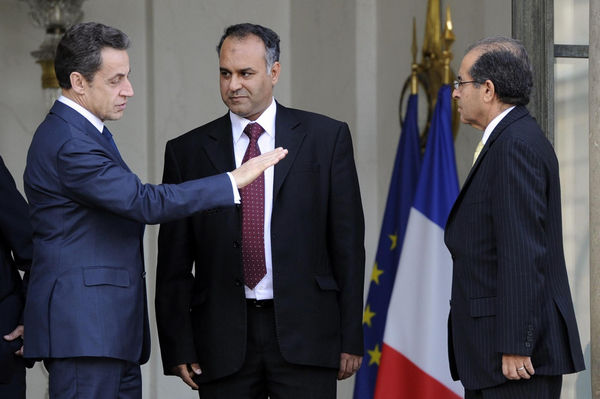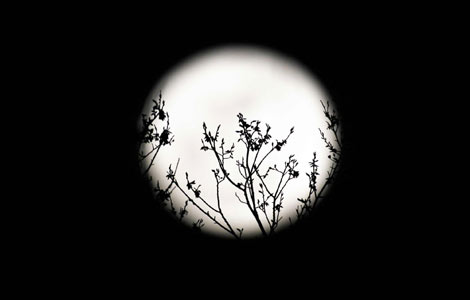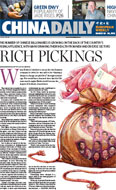Diplomatic and Military Affairs
France recognizes Libya rebels, to surprise of EU
Updated: 2011-03-11 10:18
(Agencies)
|
 France's President Nicolas Sarkozy (L) stands with Libyan National Council emissaries Mahmoud Jebril (R) and Ali Essawi after a meeting at the Elysee Palace in Paris March 10, 2011. France said on Thursday it would recognise the Libyan National Council, a rebel body fighting to oust Muammar Gadhafi, as the legitimate representative of Libya's people.[Photo/Agencies] |
BRUSSELS -- France blazed a diplomatic trail as it recognized a newly formed Libyan opposition group Thursday, drawing the ire of other European nations for stepping out on its own even as the situation in Libya remained unclear.
In Washington, US Secretary of Hillary Rodham Clinton said she will meet with members of the Libyan opposition, both in the US and when she travels to Egypt and Tunisia next week.
French President Nicolas Sarkozy shook hands with two representatives of Libya's Interim Governing Council on the steps of the Elysee Palace in Paris, as the European Union approved further sanctions to address the country's bloody crackdown and declare Gadhafi's strongman rule over.
"We must now engage in dialogue with the new representatives in Libya," French Foreign Minister Alain Juppe said. Sarkozy promised to exchange ambassadors with the council, according to his office, which later described the move as a political gesture, not an act with international legal impact.
Libya's Interim Governing Council is an umbrella group made up of rebels based in the eastern city of Benghazi, which was taken over in a deadly uprising that has spread throughout much of the oil-rich North African country.
At a meeting of EU foreign ministers in Brussels, Juppe came under immediate pressure for forcing a crack in the diplomatic front the West has shown since fighting began in Libya last month, with British Foreign Secretary William Hague admonishing, "we recognize states rather than groups within states."
"It didn't win a consensus; quite the opposite," Belgian Foreign Minister Steven Vanackere said of the French move. "It won reserved, even negative reactions."
| ||||
Libyan state TV reported late Thursday that the three, who were captured February 27 after a botched evacuation mission, will be handed over to a European delegation.
"There is not yet enough clarity about these opposition groups in and around Benghazi," said Dutch Foreign Minister Uri Rosenthal, who preached caution.
But contacts between Western officials and opposition leaders are becoming more frequent. Hague said Thursday he had spoken by telephone with Mahmoud Jabril, special envoy of the Libyan Transitional National Council, before leaving talks in Brussels.
Hague wrote on Twitter that the men had discussed "pressure on the regime, humanitarian help and no-fly zone planning."
EU nations agreed Thursday to increase financial sanctions to isolate Gadhafi's government as the union prepared to hold an emergency summit Friday. Also Thursday, NATO defense ministers discussed the imposition of a no-fly zone over Libya, should the U.N. approve one, to protect civilians from being bombed by government planes.
NATO Secretary-General Anders Fogh Rasmussen said the defense ministers also agreed to send more ships to the central Mediterranean to increases the alliance's "situational awareness" there.
The EU sanctions added five financial institutions whose assets and resources will be frozen to a list of more than two dozen individuals close to the Libyan leader. Germany also froze billions of euros (dollars) of Libya's central bank and state-run agencies.
"There is no further cooperation with Gadhafi possible," German Foreign Minister Guido Westerwelle said. "Sanctions must be broadened, more have to be decided, so that Gadhafi gets no fresh money to pay mercenaries that he uses against his own people."
Despite that kind of rhetoric from European leaders, the Libyan government was making a last-minute effort to sway them. Mohamed Tahir Siala, a Libyan envoy, met Thursday with two Greek foreign ministry officials. He had held similar talks in Lisbon on Wednesday with Portugal's Foreign Minister Luis Amado.
EU nations appeared unconvinced and said any contact with envoys amounted to passing the message that Gadhafi must leave.
"It is very clear that all options must be left open and all possible pressure should be put on so that we can get rid of Gadhafi," said Finland's Foreign Minister Alexander Stubb.
Hague said EU officials were working on contingency plans for a no fly zone and to help ease a humanitarian crisis.
"We call on Col. Gadhafi to leave and his regime to end the violence," Hague said.
Also in Brussels on Thursday, NATO, of which the United States is a member, said it had started round-the-clock surveillance of the air space over Libya, where government jets have been pounding rebel positions.
A NATO official said the first airborne warning and control plane went on patrol at 6:30 GMT (1:30 a.m. EST) Thursday morning. He said each of the Boeing E-3 Sentry aircraft will remain over the Mediterranean for eight hours before being replaced by another plane.
NATO has 17 E-3s. Several planes are currently operating over Afghanistan. The entire fleet is registered in Luxembourg, a country without an air force.
NATO decided Monday to provide the surveillance. Orders to the E-3 squadron went out on Tuesday, said the official who could not be identified under standing rules.
E-paper

City of Joy
Welcome to the 'world of smiles' where life meanders slowly.
Debate on nuclear power revived
The future is now
Common approach
Specials

Beloved polar bear died
Berlin's beloved polar bear Knut, an international star died Saturday.

Panic buying of salt
Worried Chinese shoppers stripped stores of salt on radiation fears.

'Super moon'
The "Super Moon" arrives at its closest point to the Earth in 2011.




